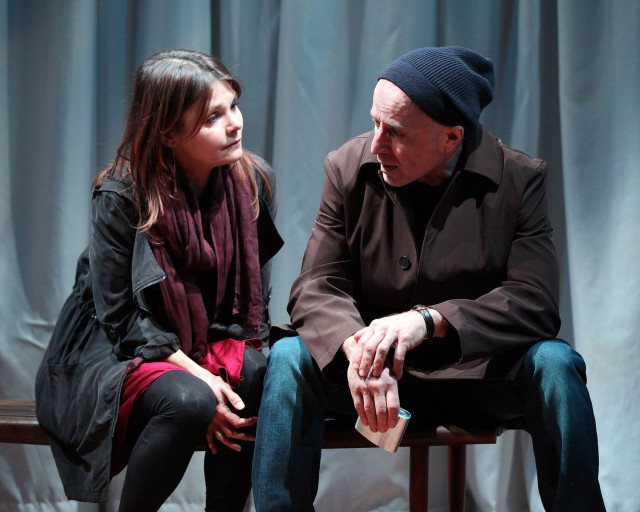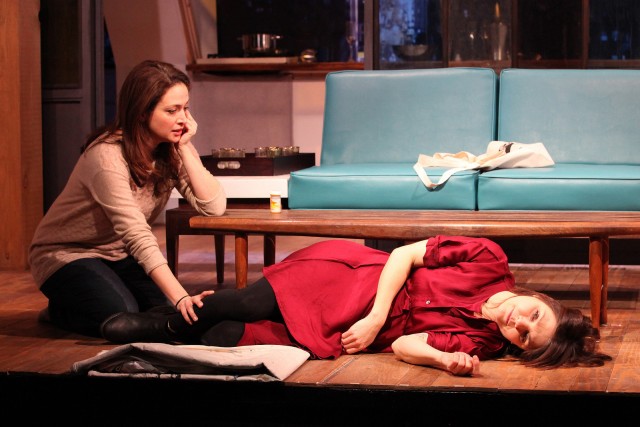
Kathryn Erbe and Arliss Howard star as alcoholics in love in new Craig Lucas play (photo © Sandra Coudert)
Cherry Lane Mainstage Theatre
38 Commerce St.
Extended through April 16, $66
212-989-2020
www.rattlestick.org
www.cherrylanetheatre.org
“If nobody walks out of a new play (before the reviews appear), something is almost certainly wrong,” Craig Lucas writes in the March issue of American Theatre. I was dismayed recently to see several people put on their coats and leave the Cherry Lane Theatre during intermission of Lucas’s new work, Ode to Joy. The first act of his investigation of love and addiction is edgy and exciting, taking chances with the dialogue and the action as two lonely problem drinkers, cardiac surgeon Bill (Arliss Howard) and painter Adele (Kathryn Erbe), meet in an otherwise empty bar (even the bartender is mostly offstage), talking about their lives, their desires, their failures, and, ultimately, their hope for a better future, perhaps together. They also discuss Kierkegaard, irony, boundaries, God, dogs, art, money, and booze, which they help themselves to by jumping over the bar. They have a whirlwind one-night romance, part awkward first date, part Days of Wine and Roses sheer unadulterated glee, Lucas’s razor-sharp dialogue hitting its mark time and time again, flowing beautifully with his fast-paced, unpredictable direction. The first act doesn’t end prettily — these are two big-time drunks, after all — but I couldn’t wait to see what would happen in the next act, as I found myself in love with the two main characters, even if I wasn’t sure I actually liked them. Adele is also joined in flashbacks by Mala (Roxanna Hope), her former girlfriend, but I hadn’t made my mind up about her yet.

Mala (Roxanna Hope) and Adele (Kathryn Erbe) experience the ups and downs of love in ODE TO JOY (photo © Sandra Coudert)
Unfortunately, the second act pales in comparison with the first. Lucas (Prelude to a Kiss, The Dying Gaul) turns his attention to the relationship between Adele and Mala, which is not nearly as interesting or entertaining as the one between Adele and Bill, which has now been reduced to Adele going through AA steps and making amends. The audience saw Adele and Bill’s story in thrilling action in the first act; in the second, we only hear of past misdeeds, sorrows, and tragedies. Suddenly the writing feels more forced, the action more stagnant. Lucas is a recovering addict himself, having given up drugs and alcohol less than ten years ago, around the same time his marriage was ending. Perhaps the play is too close to him, too personal. In the American Theatre piece, he explains that Ode to Joy is his attempt at his own Long Day’s Journey into Night. “I believe that meant I intended to tell the truth about my story. I sort of have, and I sort of haven’t,” he writes, “because I made the play’s protagonist a woman and a painter, and her relationships aren’t really mine. Or maybe they are.” It feels as if the play might be about Lucas’s own amends, and whether it actually is or isn’t doesn’t really matter, as he loses in the second act much of what he gained in the first. “Joy all creatures drink / At nature’s bosoms; / All, Just and Unjust, / Follow her rose-petalled path. / Kisses she gave us, and Wine,” Friedrich Schiller wrote in his 1785 poem “Ode to Joy,” which was later set to music by Beethoven as part of the Ninth Symphony. By all means you should stay for the second act; though it does run dry quickly, it has its clever moments and a few scattered joys, especially as Y2K approaches. It’s also the only way to get a program, given out only after the play, per Lucas’s instructions, a conceit that I found extremely appealing and one I hope more productions adopt.